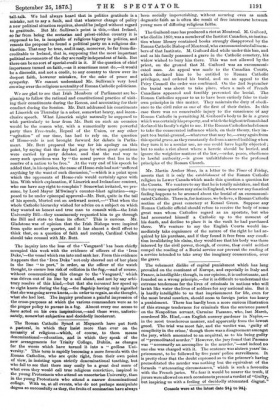We are glad to see that Irish Members of Parliament
are be- ginning to follow the rational and constitutional practice of visit- ing their constituents during the Recess, and accounting for their conduct during the Session. Mr. Butt addressed his constituents at Limerick on Thursday in a sober, somewhat heavy, and incon- clusive speech. What Limerick might naturally be supposed to wish particularly to hear from Mr. Butt on such an occasion would be the reason why, with a numerically more powerful party than Free-trade, Repeal of the Union, or any other "agitation" of our time, has had to rely on, the question of Home-rule is not brought forward for debate in Parlia- ment. Mr. Butt prepared the way for his apology on this point, by saying that the day had gone by when great questions were carried by party debates, and that the real way to carry such questions was by "the moral power that lies in the resolve of a nation to be free." At the very end of his speech he added that, in his opinion, the cause of Home-rule had not " suffered anything by the want of such discussion,"—which is a point upon which the opponents of Home-rule would certainly agree with him. With which explanation, if Limerick and Ireland are content, who can have any right to complain ? Somewhat irritated, we pre- sume, by Lord Mayor M'Swiney's counter-blast agitation—sup- posed to be under episcopal approval—Mr. Butt, quite in the tail of his speech, blurted out an awkward secret,—" That when the whole Catholic hierarchy wished for advice on a subject on which they wanted an honest and true man to consult with—the Irish University Bill—they unanimously requested him to go through the Bill and state to them its effect." This is curious. Mr. Gladstone was of opinion that the Irish Bishops were inspired from quite another quarter, and it has almost a droll effect to think that, on a question of faith and morals, Cardinal Cullen should take counsel with Mr. Butt.






























 Previous page
Previous page